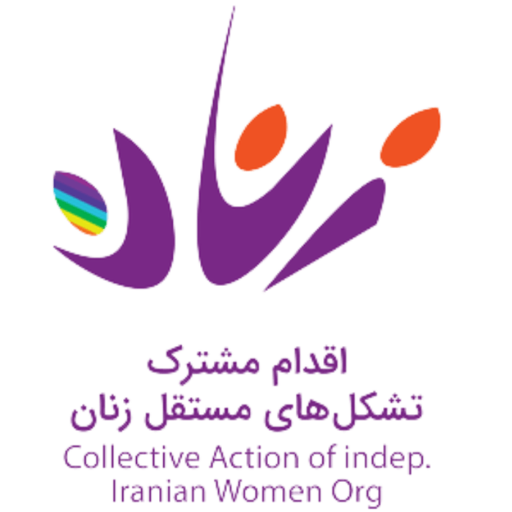We, 24 independent organizations of Iranian women in the diaspora, reflect on the experiences, achievements, and challenges two years after the revolutionary uprising of Jina. This movement, sparked by the government’s killing of Jina (Mahsa) Amini, began with a quest for a life free of discrimination and inequality and has been named the “Jin, Jiyan, Azadi” movement.
Despite the heavy price of many lives and the eyes of life enthusiasts, this movement continues, with Jina’s name becoming a symbol of liberation. Jina, Mahu, the girl from Chahbahar, and Marzieh Taherian exposed societal conflicts, and as the women of Dasgoharan say, ‘society’s patience all of a sudden overflowed and erupted.’ The continuous struggles of women against inequality, from March 1979 to the peak of these struggles in December 2017, and the consistent struggles of women from various nationalities and ethnic groups in Iran, such as Kurds, Baluchis, Arabs, and the queer community, under the harshest security-military conditions, up to occupying the streets in 2022, have been aligned in this revolutionary movement. All the ongoing and scattered struggles of the past decades, both at the center and the periphery, which were often ignored, have surfaced to the extent that they can no longer be denied. The proliferation of resistance and struggle in the nationwide protests of ‘Woman, Life, Freedom,’ which at times were suppressed by various tyrants, continues. It is enough to look at the recent ongoing struggles against the death penalty, compulsory hijab, hatred towards nationalities and class oppression, the persistent and impactful movement for justice, and students’ resistance with the same ‘NO’ to the system, gender discrimination, and collectively fighting for a better life, which have transformed the face of cities. Indeed, these serious but unorganized struggles over several decades against the reactionary and patriarchal structure of the state, religion, and capital have taken a significant step forward.
The impact of these struggles can be seen in the demands of retirees and the slogans of Sunday protests, which echoed nationwide, by men and women retirees in the streets across the country. Slogans like: ‘Men and women are equal, they are united and brave,’ ‘With the power of men and women, oppression trembles,’ ‘Injustice and oppression here are doubled for women,’ and ‘Let go of headscarf, take care of us’ are no longer exceptional and reflect the rise of equality-seeking struggles among different social classes.
The struggle of political prisoners, especially women prisoners, is another aspect of the resistance that has stood up against suppression, torture, and executions with weekly Tuesday hunger strikes in prison. This campaign, with sit-ins in the women’s ward yard of Evin against the execution sentences of women on death row, such as Sharifeh Mohammadi and Pakhshan Azizi, influential figures in the labor and freedom movements, has entered a new phase. These death sentences are not just against these two political activists but against all activists to intimidate them.
On the other hand, we witnessed the efforts of misogynist candidates of this government, who, by denying their roles in establishing this gender apartheid regime, desperately encouraged people to participate in the recent election, denying the existence of government agencies for control over women’s bodies and other suppressions.
We also remember the tragedy of another September, the massacre of thousands of political prisoners, both men and women, in the 1980s. We remember the historic trial of Hamid Nouri (in Sweden), the deputy warden of Gohardasht prison, accused of participating in the ‘killing factory’ in the summer of 1988. Unfortunately, shortly after his life sentence was confirmed in the appeals court in Sweden in June 2024, he was exchanged with Swedish prisoners.
We learn from this event that the slogan of the ‘Woman, Life, Freedom’ movement, ‘Our power is in our unity,’ should remain our guiding principle and not rely on foreign powers and governments.
We, the independent women’s organizations, learning from these struggles, step forward with solidarity and the slogan of ‘Woman, Life, Freedom.’ We will not retreat until we achieve equality, liberation, freedom, and the elimination of all forms of oppression against women. We know that achieving these goals is impossible under the Islamic Republic or any other oppressive regime.
In the end, while honoring the struggles of feminist women around the world for peace and equality, we express our solidarity with the women and children of the world, especially women and children of Palestine and Afghanistan.
Association of Iranian Women in Montreal
Collective of Woman Life Freedom – Rome
Dallas Iranian Women Association (DIWA).
Everyday Feminism
Frauen Tribunal – Hannover, Germany
Free Iranian Women’s Association
Gender Equality Committee of Solidarity of Republicans of Iran
IKWRO-Women Rights Organizations.
Iranian Circle of Women for International Networking (ICWIN)
Iranian Women Activist in Exile – Berlin, Germany
Iranian Women Association of Parto, Germany.
Iranian-German women’s association, Cologne, Germany
IWIN Iranian Women In Network
Left Unity of Women
Maanaav – LGBTQ Community – Sweden
Me Too Movement Iran
Orange County Women Study Group.
Stop honor Killings
The Organization for Emancipation of Women
Together for Women’s Health Foundation.
Women for Sustainable Freedom & Equality
Zanan Group in Northern California
